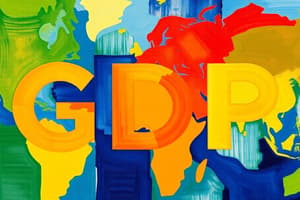Podcast
Questions and Answers
What are some factors that can affect the economic development of a country?
What are some factors that can affect the economic development of a country?
Natural resources, infrastructure, political stability, education and human capital, innovation and technology, trade and investment
What are some challenges that countries face in economic development?
What are some challenges that countries face in economic development?
Income inequality, environmental sustainability, corruption, financial instability
How can natural resources affect a country's potential for economic growth?
How can natural resources affect a country's potential for economic growth?
Countries rich in natural resources, such as oil, minerals, and water, have a greater potential for economic growth.
What are some strategies for promoting economic development?
What are some strategies for promoting economic development?
What role does political stability play in economic development?
What role does political stability play in economic development?
What disciplines contribute to the multidisciplinary field of economic development?
What disciplines contribute to the multidisciplinary field of economic development?
Why is innovation crucial for economic growth?
Why is innovation crucial for economic growth?
How does good infrastructure contribute to economic development?
How does good infrastructure contribute to economic development?
Why is a well-educated workforce vital for economic growth?
Why is a well-educated workforce vital for economic growth?
What is the ultimate goal of economic development?
What is the ultimate goal of economic development?
How do government policies and regulations influence economic development?
How do government policies and regulations influence economic development?
What is the focus of the Export-Oriented Industrialization strategy?
What is the focus of the Export-Oriented Industrialization strategy?
What is the aim of the Import Substitution Industrialization strategy?
What is the aim of the Import Substitution Industrialization strategy?
How does income inequality hinder economic development?
How does income inequality hinder economic development?
What is the emphasis of the Sustainable Development strategy?
What is the emphasis of the Sustainable Development strategy?
Flashcards are hidden until you start studying
Study Notes
Economic Development
Economic development is the process by which a country, region, or city increases its per capita income, wealth, and standard of living. This can be achieved through various means, including industrialization, modernization, and the expansion of the economy. Economic development is often measured by the growth in a country's Gross Domestic Product (GDP) per capita.
History of Economic Development
Historically, economic development has been driven by a combination of factors, including technological innovation, access to resources, and the establishment of efficient markets. The Industrial Revolution, which began in the late 18th century, marked a turning point in human history and set the stage for the modern era of economic development.
Types of Economic Development
There are two types of economic development:
-
Internal Development: This occurs when a country's economy grows without the help of foreign investors or governments. It is driven by domestic factors such as improved technology, increased productivity, and a more efficient economy.
-
External Development: This is when a country's economy grows with the help of foreign investors or governments. It is driven by external factors such as foreign aid, trade agreements, and the establishment of multinational corporations.
Factors Affecting Economic Development
There are numerous factors that can affect the economic development of a country. Some of the most significant include:
-
Natural Resources: Countries rich in natural resources, such as oil, minerals, and water, have a greater potential for economic growth.
-
Infrastructure: A well-developed infrastructure, including roads, transportation systems, and communication networks, can facilitate trade and investment.
-
Political Stability: A stable political environment is essential for economic development, as it provides a predictable and reliable foundation for businesses to operate.
-
Education and Human Capital: Investment in education and the development of skilled workers can contribute to a country's economic growth.
-
Innovation and Technology: A country's ability to innovate and adopt new technologies can drive economic growth.
-
Trade and Investment: Open markets and free trade can foster economic growth by increasing access to new markets and encouraging investment.
Challenges in Economic Development
Despite the benefits of economic development, there are also numerous challenges that countries face. Some of the most significant include:
-
Income Inequality: Economic development can sometimes exacerbate income inequality, as the benefits of growth may not be evenly distributed.
-
Environmental Sustainability: Economic development can have negative environmental impacts, such as pollution and resource depletion.
-
Corruption: Corruption can undermine economic development by discouraging investment and eroding public trust in government institutions.
-
Financial Instability: Economic development can be threatened by financial crises, which can lead to instability and even collapse.
Strategies for Promoting Economic Development
To promote economic development, countries can adopt various strategies, such as:
-
Investing in Education and Human Capital: This can help develop the skills and knowledge needed to drive economic growth.
-
Improving Infrastructure: Better infrastructure can facilitate trade, investment, and innovation.
-
Promoting Economic Diversification: Diversifying the economy can help reduce dependence on any one sector and reduce the risk of economic downturns.
-
Encouraging Innovation and Technology: This can help countries stay competitive and drive economic growth.
-
Supporting Entrepreneurship: Encouraging entrepreneurship can help create new businesses and jobs, which can contribute to economic growth.
-
Promoting Sustainable Economic Growth: This can help ensure that economic development is environmentally sustainable and socially inclusive.
Conclusion
Economic development is a complex and multifaceted process that involves various factors, challenges, and strategies. By understanding these factors and adopting the appropriate strategies, countries can work towards achieving sustainable and inclusive economic growth.
Studying That Suits You
Use AI to generate personalized quizzes and flashcards to suit your learning preferences.




